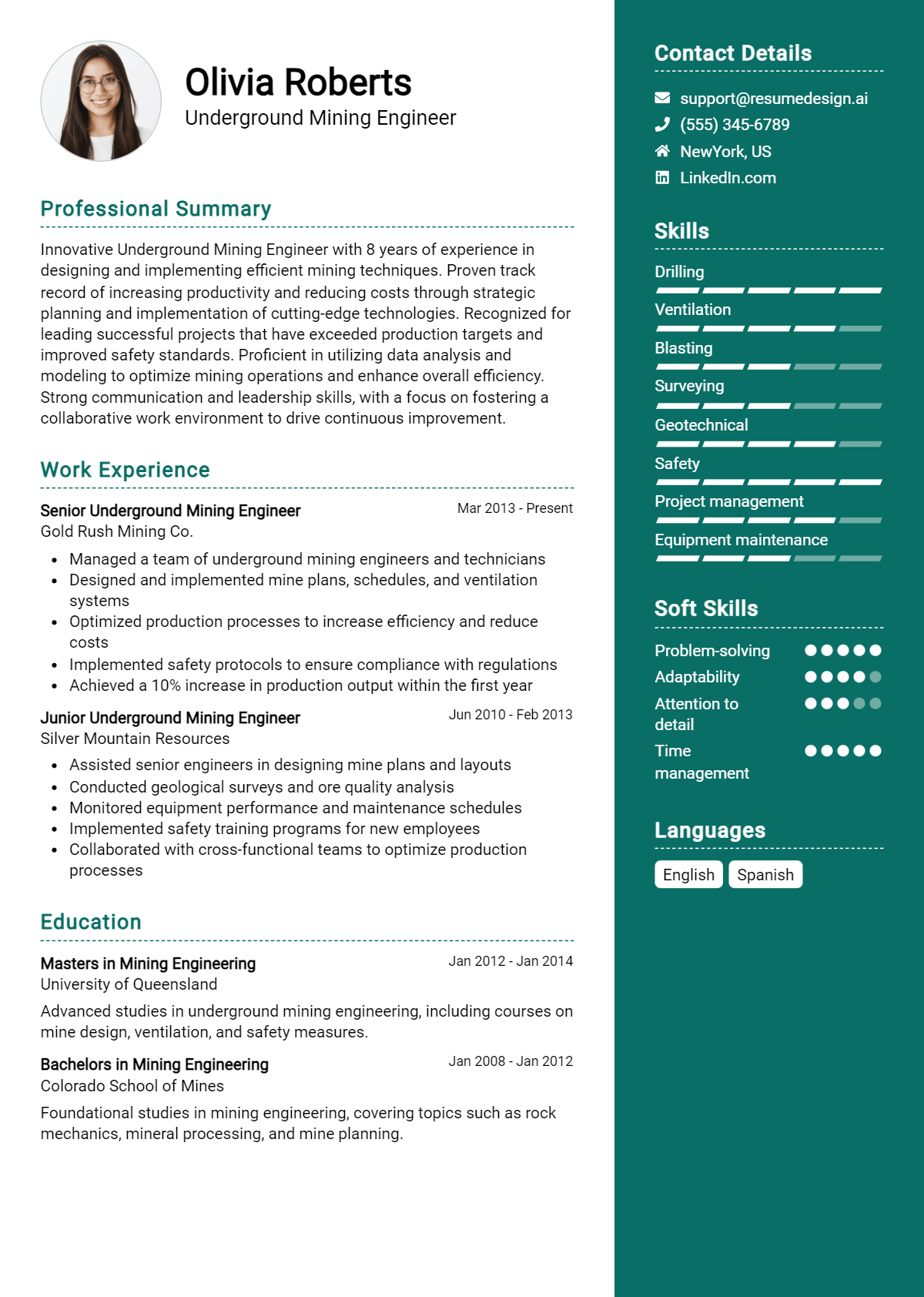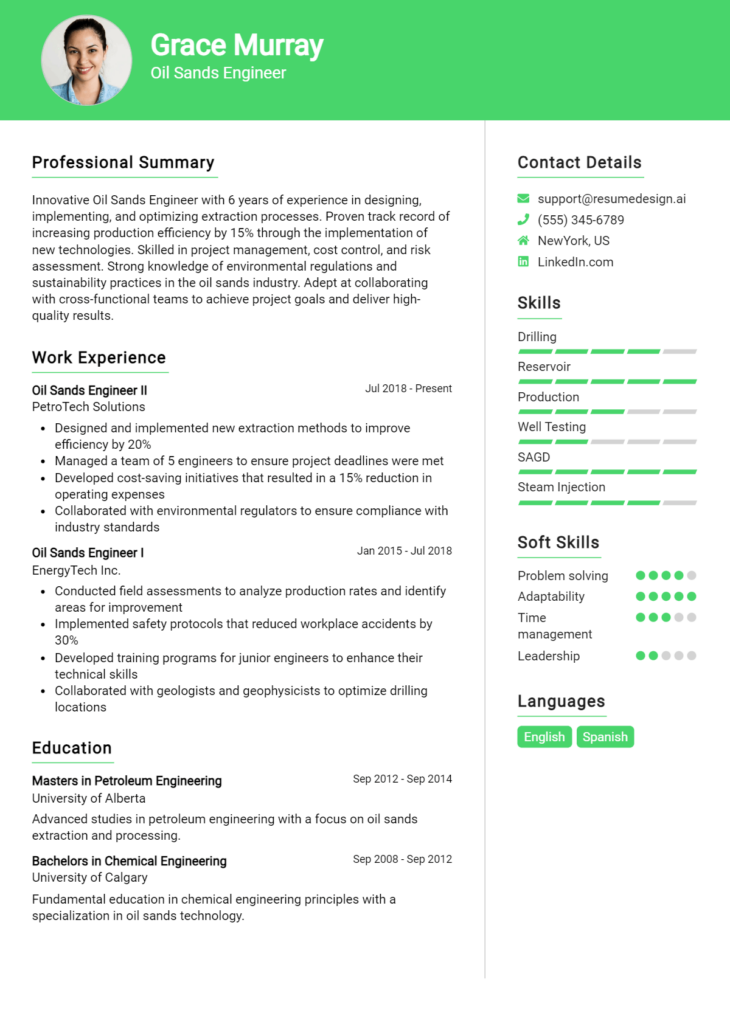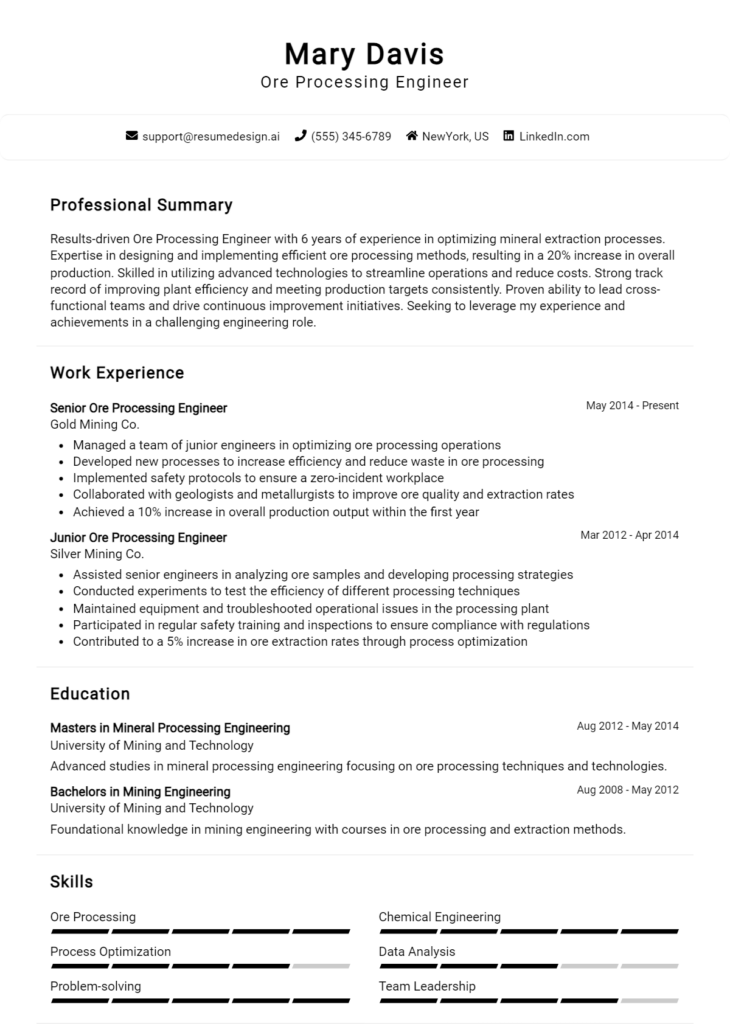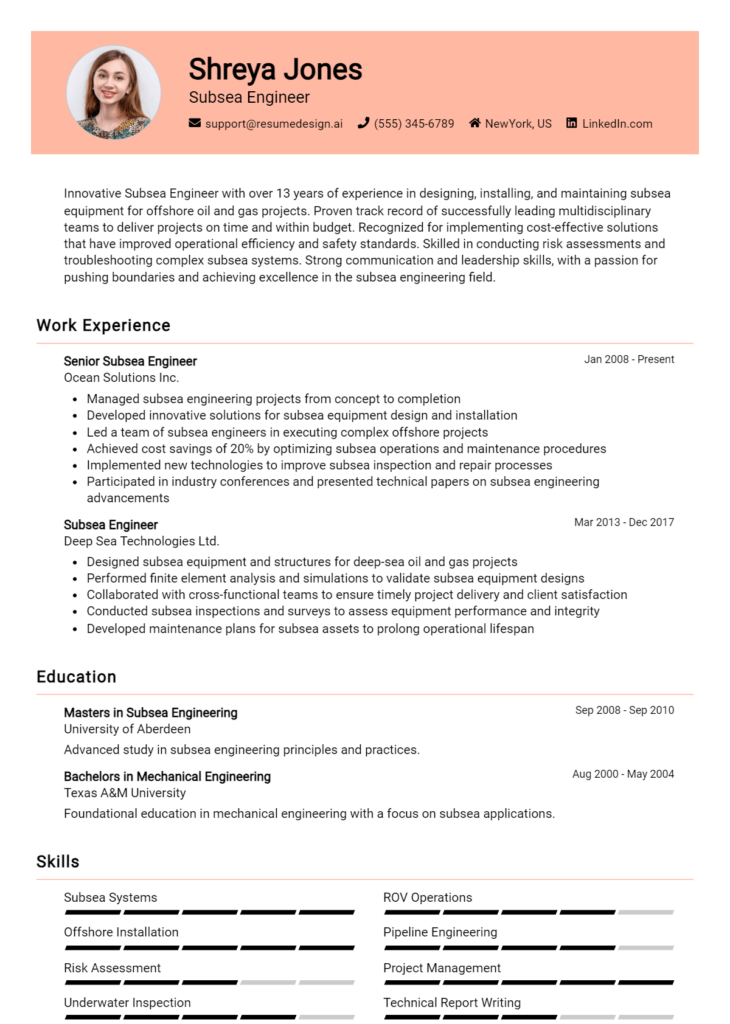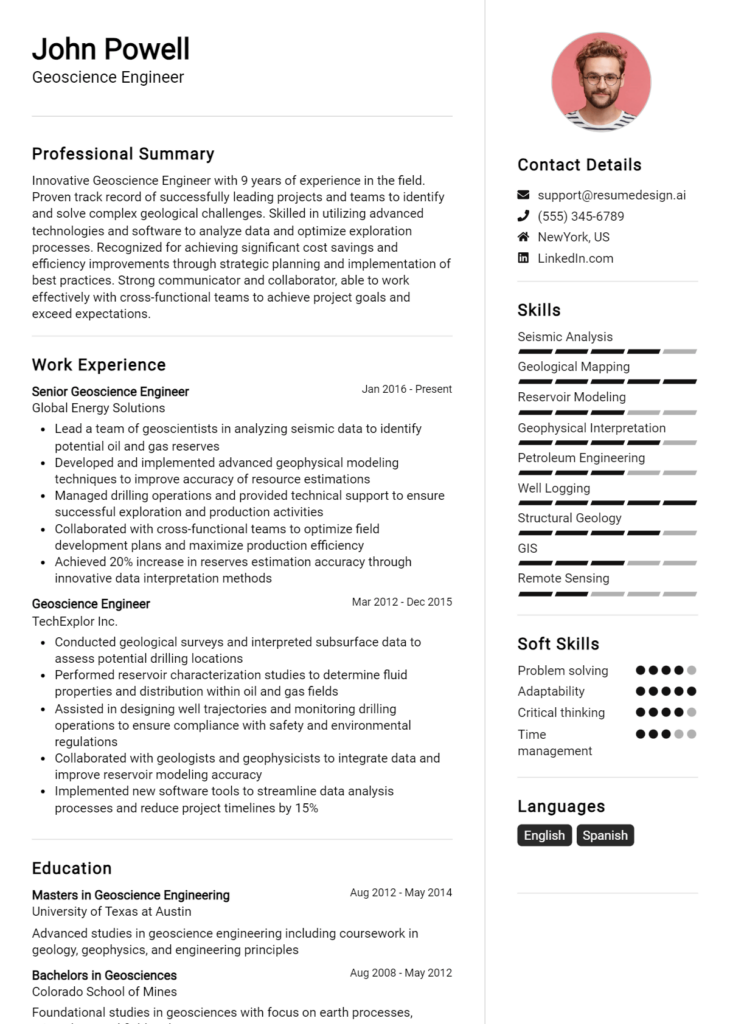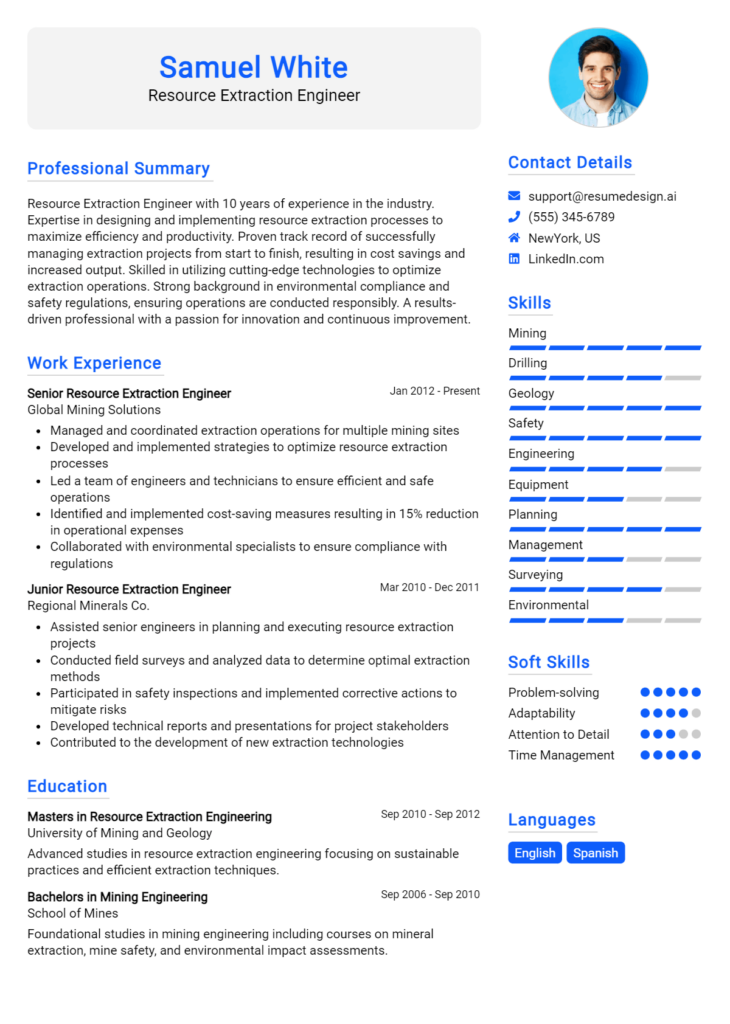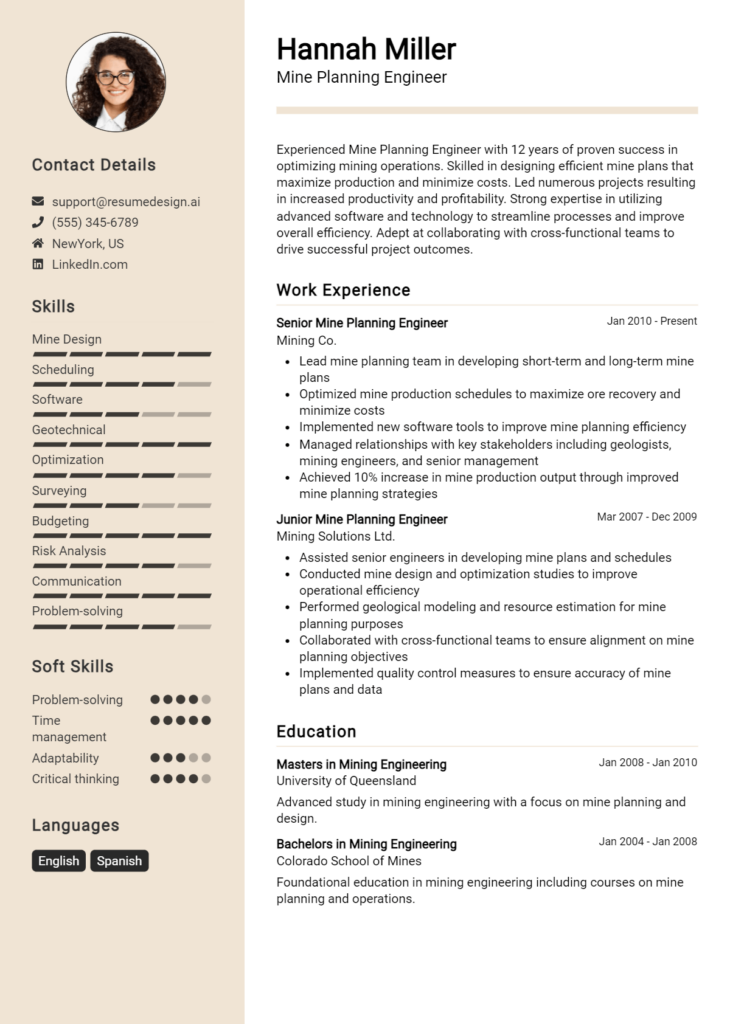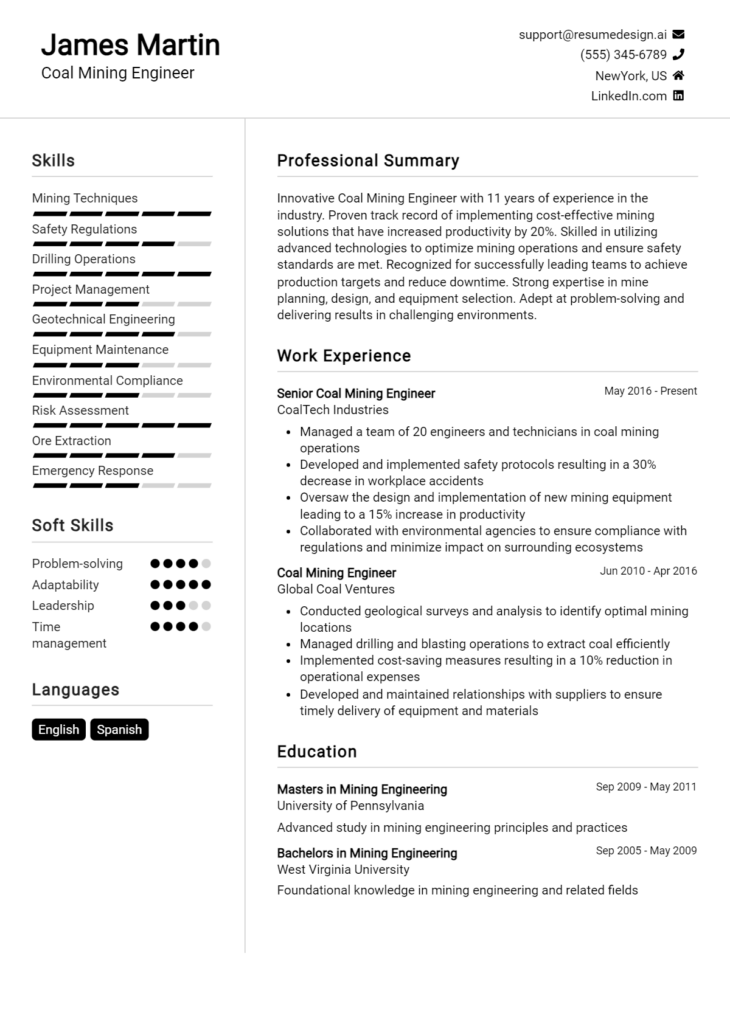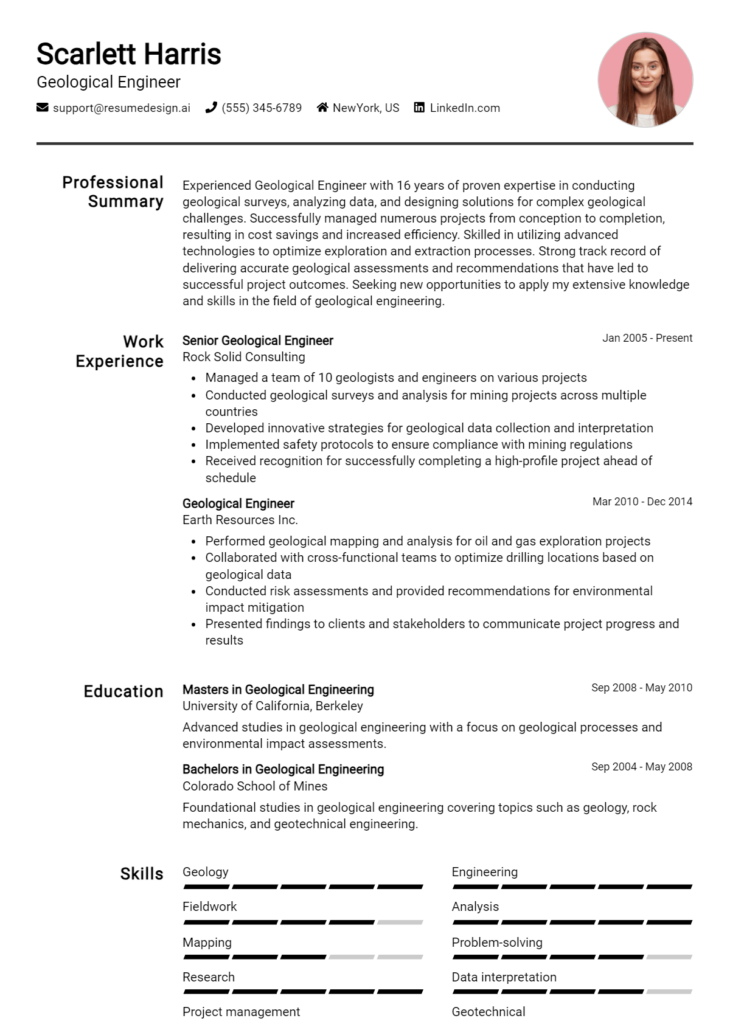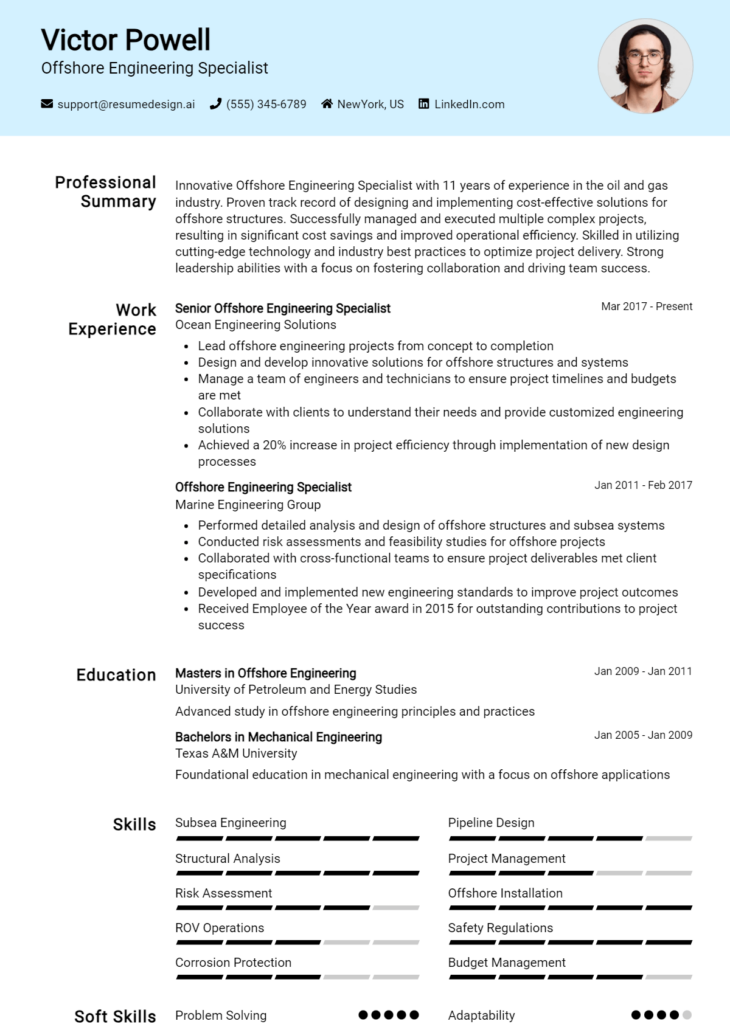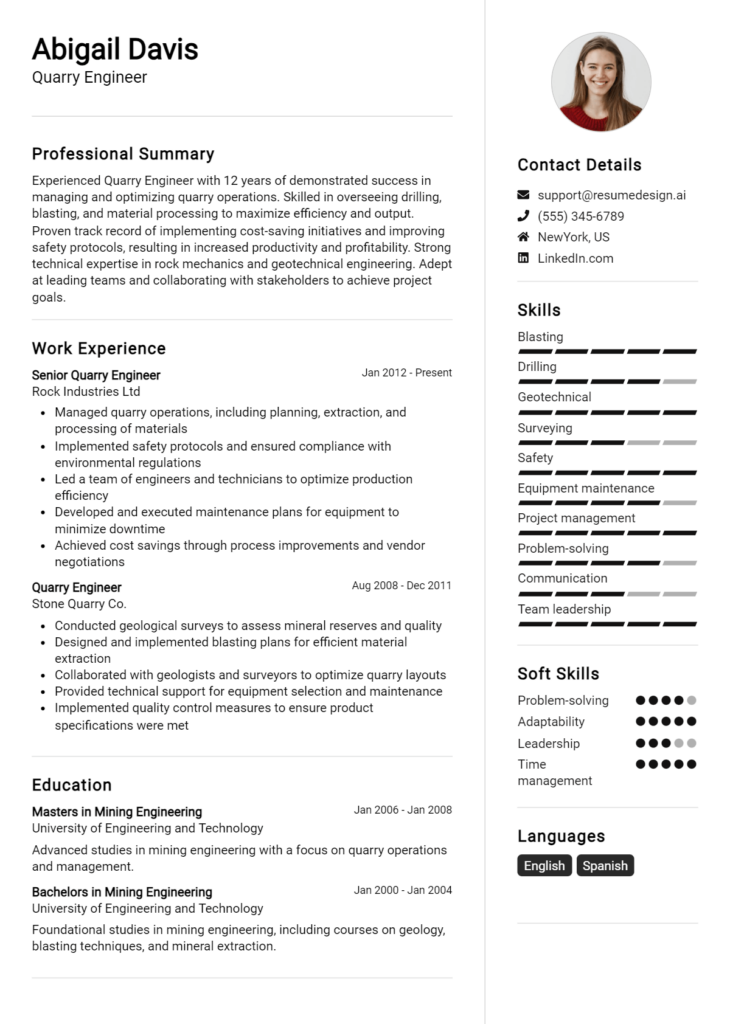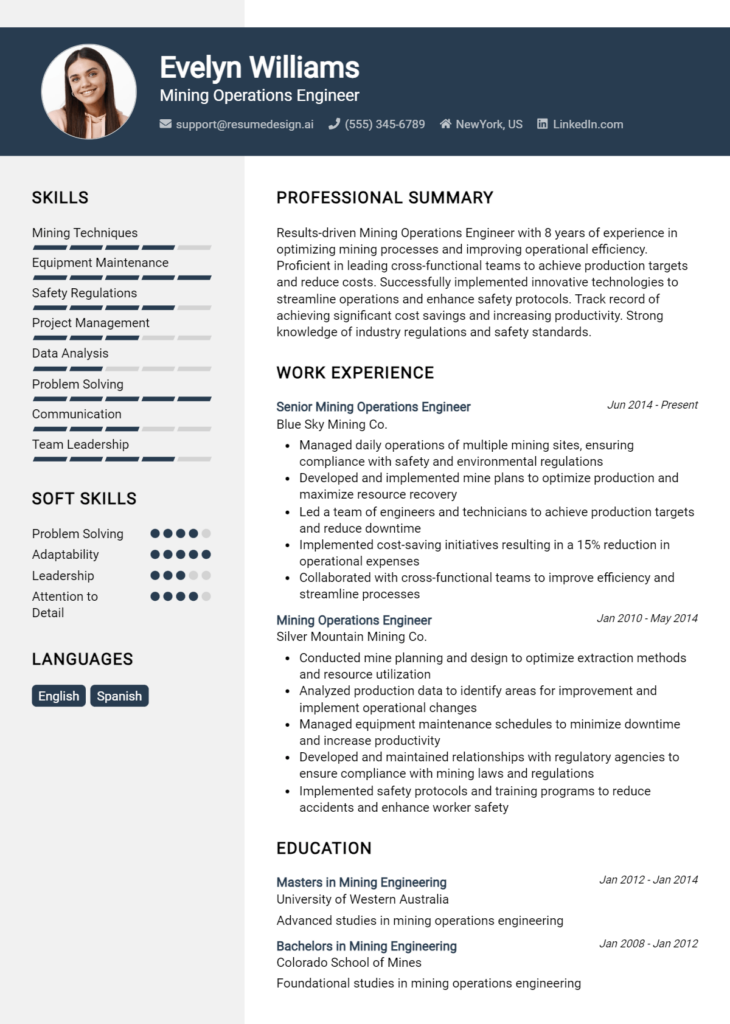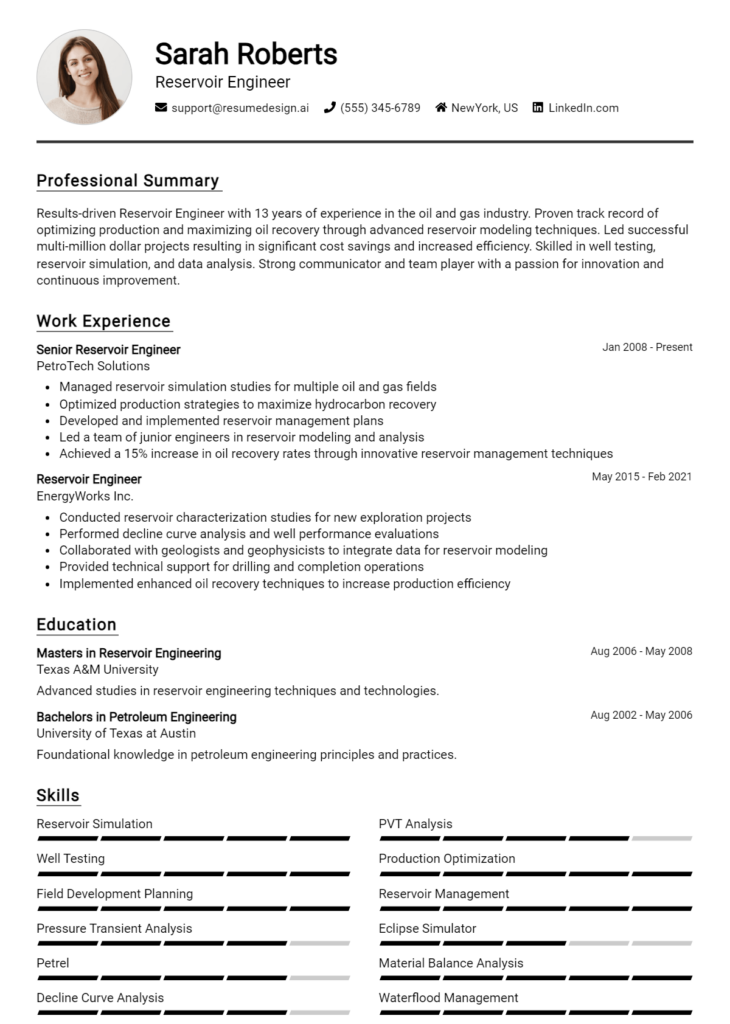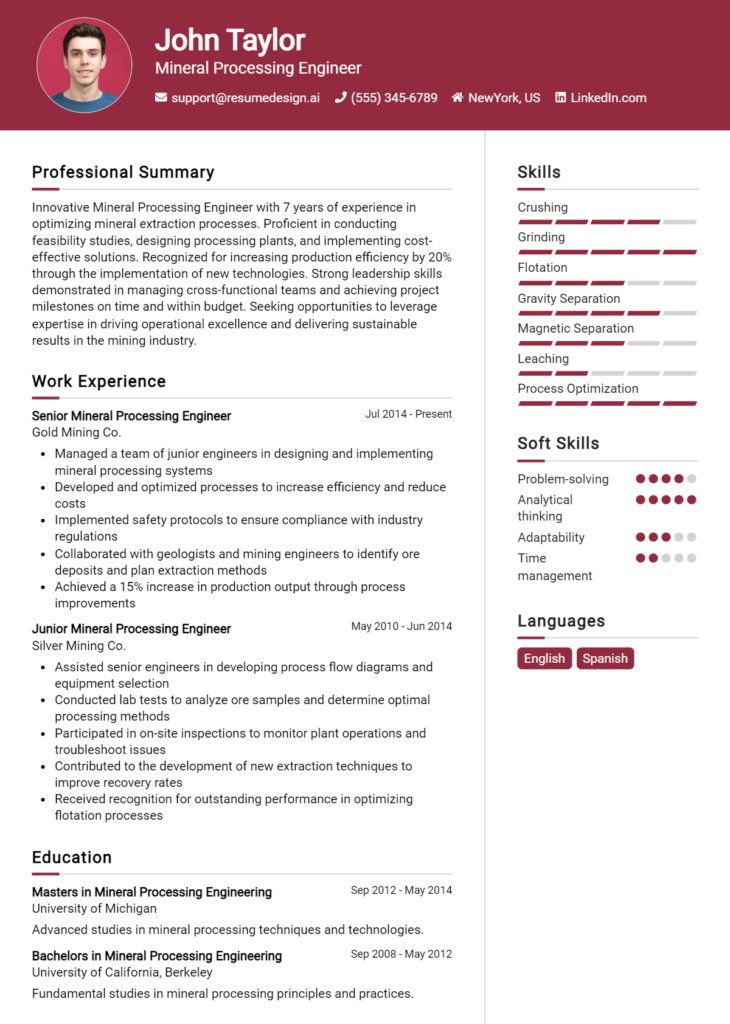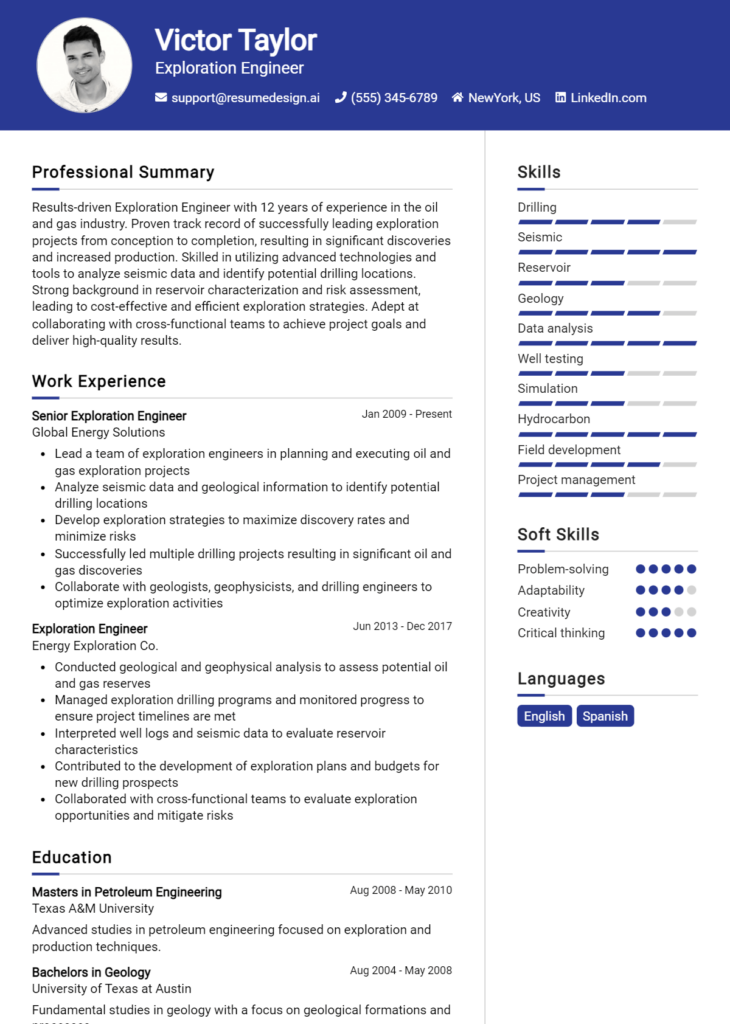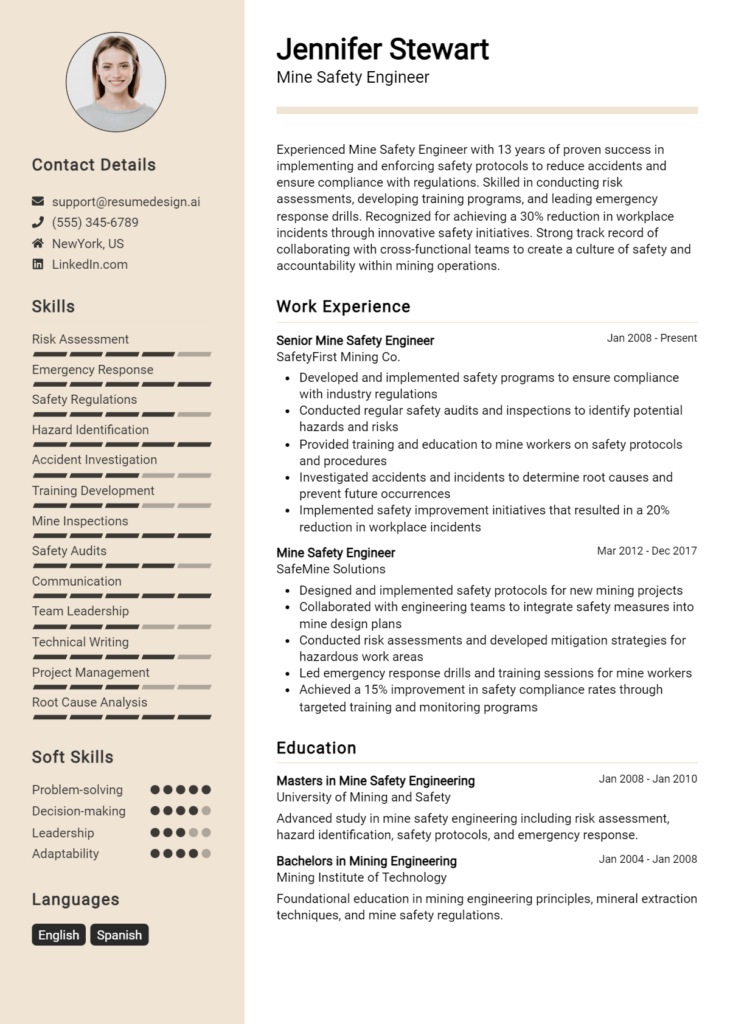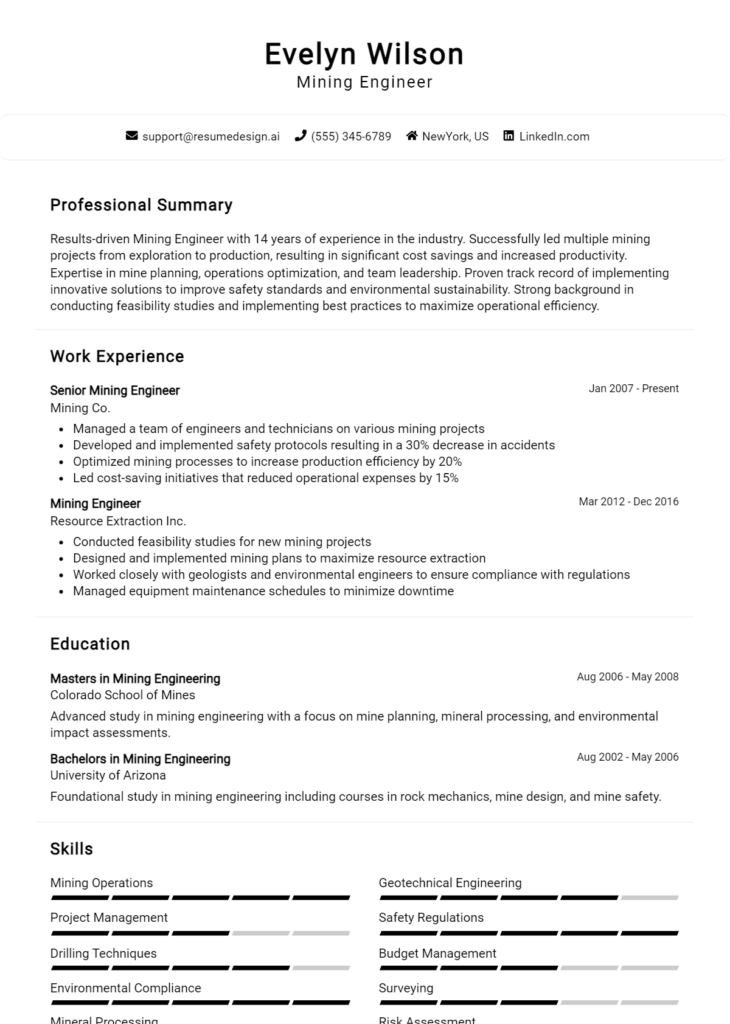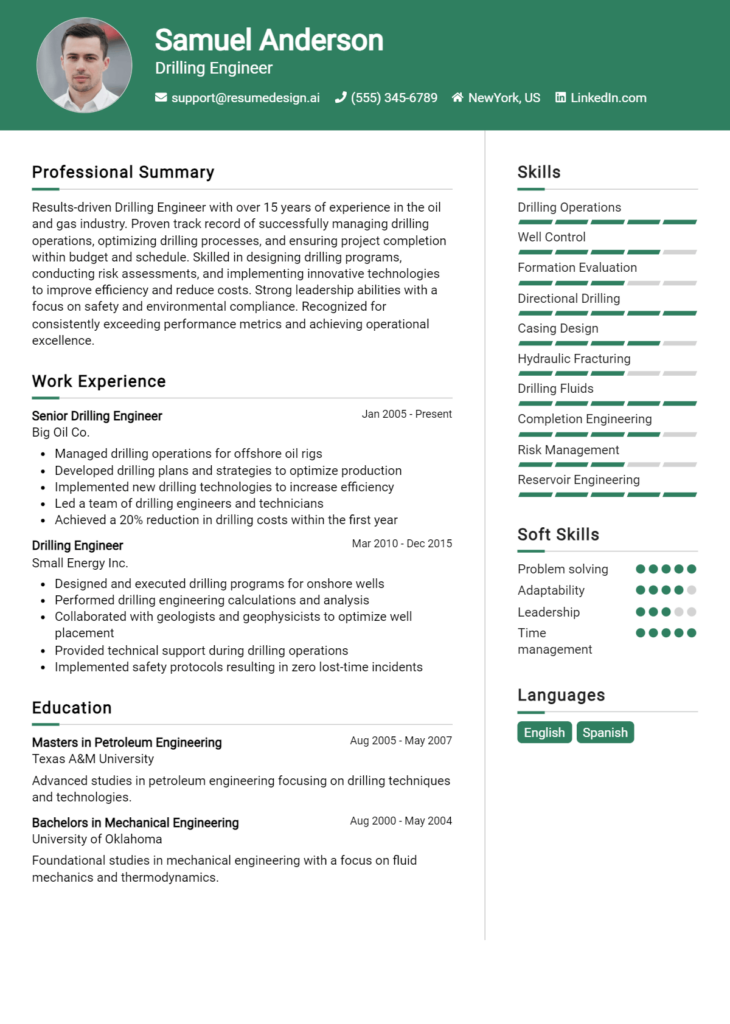Underground Mining Engineer Core Responsibilities
Underground Mining Engineers play a crucial role in managing the technical and operational aspects of mining projects. They are responsible for designing safe and efficient mine layouts, overseeing excavation processes, and ensuring compliance with safety regulations. This role requires strong problem-solving skills, technical knowledge, and the ability to collaborate across departments such as geology, operations, and environmental management. A well-structured resume highlighting these qualifications is essential in demonstrating how these skills contribute to the organization’s overall success.
Common Responsibilities Listed on Underground Mining Engineer Resume
- Design and develop underground mine layouts and plans.
- Conduct feasibility studies and risk assessments.
- Oversee excavation operations to ensure safety protocols are met.
- Collaborate with geologists to assess mineral deposits.
- Monitor and optimize production processes and equipment performance.
- Implement and manage environmental control measures.
- Prepare technical reports and documentation for stakeholders.
- Lead and train teams on safety practices and operational procedures.
- Analyze and troubleshoot mining-related issues and challenges.
- Coordinate with regulatory agencies to ensure compliance.
- Develop budgets and manage project costs effectively.
High-Level Resume Tips for Underground Mining Engineer Professionals
In the competitive field of underground mining engineering, a well-crafted resume is essential for standing out among qualified candidates. Your resume often serves as the first impression you make on a potential employer, highlighting not only your technical skills but also your achievements and contributions to past projects. It is crucial for your resume to effectively reflect your expertise and the value you can bring to an organization. This guide will provide practical and actionable resume tips specifically tailored for Underground Mining Engineer professionals, ensuring you present yourself in the best possible light.
Top Resume Tips for Underground Mining Engineer Professionals
- Tailor your resume for each job application by closely aligning your skills and experiences with the job description.
- Highlight relevant experience in underground mining projects, including specific roles and responsibilities.
- Quantify your achievements with concrete data, such as the percentage of cost reductions or improvements in safety metrics you have implemented.
- Showcase industry-specific skills, such as knowledge of mining software, geological modeling, and regulatory compliance.
- Incorporate keywords from the job listing to pass through applicant tracking systems (ATS) effectively.
- Detail any certifications or training related to underground mining, such as MSHA training or engineering licenses.
- Include a summary statement that encapsulates your career goals and key accomplishments in underground mining engineering.
- Use action verbs to describe your experiences, emphasizing your proactive contributions and leadership roles.
- Keep the layout clean and professional, ensuring that your contact information is easily accessible at the top.
- Proofread your resume for grammatical errors and clarity, as attention to detail is crucial in engineering roles.
By implementing these tips, you can significantly increase your chances of landing a job in the underground mining engineering field. A polished and targeted resume will not only showcase your technical expertise but also demonstrate your commitment to the industry and your potential to contribute to a prospective employer's success.
Why Resume Headlines & Titles are Important for Underground Mining Engineer
In the competitive field of underground mining engineering, a well-crafted resume headline or title is essential for making a strong first impression on hiring managers. A powerful headline can immediately capture attention and succinctly summarize a candidate's key qualifications, allowing them to stand out among many applicants. It should be concise, relevant, and directly related to the position being applied for, as it serves as a quick reference to the candidate's expertise and suitability for the role. A compelling headline not only piques interest but also sets the tone for the rest of the resume, guiding hiring managers through the candidate's professional narrative.
Best Practices for Crafting Resume Headlines for Underground Mining Engineer
- Keep it concise: Aim for a headline that is brief yet impactful, ideally one to two lines.
- Be role-specific: Tailor the headline to the specific position of underground mining engineer to demonstrate relevance.
- Highlight key skills: Incorporate primary skills or areas of expertise that align with the job description.
- Use action-oriented language: Choose dynamic verbs that convey proactivity and results-driven attributes.
- Include quantifiable achievements: If possible, reference measurable accomplishments to enhance credibility.
- Avoid jargon: Use clear language that is easily understood, avoiding overly technical terms that might confuse readers.
- Reflect your personal brand: Ensure that the headline communicates your unique professional identity and value proposition.
- Revise and refine: Continuously assess and update your headline to keep it fresh and aligned with your career goals.
Example Resume Headlines for Underground Mining Engineer
Strong Resume Headlines
Results-Driven Underground Mining Engineer with 5+ Years of Experience in Safety Compliance and Project Management
Innovative Mining Engineer Specializing in Sustainable Practices and Cost-Effective Solutions
Dedicated Underground Mining Engineer with Proven Track Record of Reducing Operational Costs by 20%
Weak Resume Headlines
Mining Engineer Seeking Job
Experienced Engineer
The strong resume headlines are effective because they provide specific information about the candidate's experience, skills, and achievements, making it easy for hiring managers to recognize their qualifications at a glance. In contrast, the weak headlines are vague and generic, failing to convey any meaningful information or unique value, which can leave hiring managers unimpressed and uninterested in reviewing the rest of the resume. A compelling headline is crucial in establishing a strong connection between the candidate and the job opportunity.
Writing an Exceptional Underground Mining Engineer Resume Summary
In the competitive field of underground mining engineering, a well-crafted resume summary is essential for standing out to hiring managers. This brief yet impactful section serves as a snapshot of a candidate's key skills, relevant experience, and notable accomplishments, allowing potential employers to quickly gauge their fit for the role. A strong resume summary not only captures attention but also sets the tone for the rest of the application. Therefore, it should be concise, impactful, and tailored specifically to the job at hand, highlighting the unique strengths that position the candidate as an ideal choice for the underground mining engineering position.
Best Practices for Writing a Underground Mining Engineer Resume Summary
- Quantify achievements to demonstrate impact and effectiveness.
- Focus on key skills that are directly relevant to underground mining engineering.
- Tailor the summary to match the job description, using keywords from the listing.
- Keep it concise, ideally between 3-5 sentences.
- Highlight unique qualifications, such as certifications or specialized training.
- Showcase problem-solving abilities and innovative approaches in past roles.
- Emphasize teamwork and leadership skills, as these are crucial in mining operations.
- Use action verbs to convey a sense of proactivity and results-oriented mindset.
Example Underground Mining Engineer Resume Summaries
Strong Resume Summaries
Detail-oriented Underground Mining Engineer with over 8 years of experience in optimizing mining operations, resulting in a 15% reduction in operational costs. Proven track record in implementing safety measures that decreased accident rates by 25% while enhancing team productivity through effective training programs.
Dynamic Mining Engineer skilled in geological mapping and resource estimation, with a successful history of managing projects valued at over $10 million. Experienced in collaborating with cross-functional teams to increase mineral recovery rates by 30% through innovative mining techniques.
Results-driven Underground Mining Engineer with expertise in tunnel design and ventilation systems, contributing to projects that enhanced airflow efficiency by 40%. Strong background in utilizing advanced software for mine planning and simulation, leading to improved project timelines.
Weak Resume Summaries
Experienced mining engineer looking for a new opportunity in the underground mining field. I have worked on various projects and have a good understanding of mining operations.
Dedicated engineer with experience in mining. Has worked in different capacities and is seeking to apply skills in a new position.
The examples provided illustrate the distinction between strong and weak resume summaries. Strong summaries are characterized by specific accomplishments, quantifiable results, and relevant skills that directly align with the demands of the underground mining engineering role. In contrast, weak summaries lack detail, specificity, and measurable outcomes, making them less impactful and harder for hiring managers to connect with the applicant's potential value to the organization.
Work Experience Section for Underground Mining Engineer Resume
The work experience section of an Underground Mining Engineer resume is crucial as it serves as a comprehensive showcase of the candidate's technical skills, project management abilities, and capacity to deliver high-quality results in challenging environments. This section enables candidates to illustrate their practical experience in underground mining operations, demonstrating their proficiency in using specialized equipment, adhering to safety standards, and implementing innovative solutions. By quantifying achievements and aligning experiences with industry standards, candidates can effectively communicate their value to potential employers, making it easier for them to stand out in a competitive job market.
Best Practices for Underground Mining Engineer Work Experience
- Highlight specific technical skills relevant to underground mining operations, such as geotechnical analysis and mine design.
- Quantify results with metrics, such as increased production efficiency or reduced operational costs.
- Emphasize leadership roles and team management experience, demonstrating the ability to guide diverse teams.
- Showcase collaboration with cross-functional teams, including safety, environmental, and engineering departments.
- Detail involvement in safety programs and initiatives, underscoring a commitment to workplace safety.
- Include relevant certifications or training that enhance your qualifications in the mining sector.
- Align experiences with industry standards, using terminology and frameworks familiar to mining professionals.
- Utilize action verbs to convey impact and engagement in all descriptions of past roles and responsibilities.
Example Work Experiences for Underground Mining Engineer
Strong Experiences
- Led a team of 15 engineers in the successful design and implementation of a new underground ventilation system, resulting in a 30% improvement in air quality and safety compliance.
- Managed a project that increased production rates by 25% through the optimization of drilling and blasting techniques, saving the company $2 million in operational costs over two years.
- Collaborated with environmental specialists to develop and execute a waste management plan that reduced environmental impact by 40%, achieving regulatory compliance ahead of schedule.
- Implemented a predictive maintenance program for underground equipment, reducing downtime by 15% and increasing overall equipment effectiveness.
Weak Experiences
- Worked on various mining projects and assisted other engineers with their tasks.
- Participated in meetings regarding safety protocols and mine operation improvements.
- Helped with data collection for mining operations without specific outcomes or impacts mentioned.
- Conducted routine inspections of underground facilities and reported issues as needed.
The examples provided illustrate the difference between strong and weak experiences in an Underground Mining Engineer resume. Strong experiences are characterized by specific achievements, quantifiable results, and clear demonstrations of leadership and collaboration, conveying a candidate's impact in their roles. In contrast, weak experiences lack detail, measurable outcomes, and specific contributions, making it difficult for potential employers to assess the candidate's true capabilities and value to their organization.
Education and Certifications Section for Underground Mining Engineer Resume
The education and certifications section of an Underground Mining Engineer resume plays a crucial role in showcasing a candidate's academic background and professional qualifications. This section not only highlights the relevant degrees and certifications that align with industry standards but also demonstrates the candidate's commitment to continuous learning and professional development. By providing specific coursework, recognized certifications, and specialized training, candidates can significantly enhance their credibility and appeal to potential employers, reinforcing their alignment with the requirements of the job role.
Best Practices for Underground Mining Engineer Education and Certifications
- Include relevant degrees in mining engineering, geological engineering, or related fields.
- List industry-recognized certifications, such as Professional Engineer (PE) or Mine Safety and Health Administration (MSHA) certifications.
- Provide details on specialized training programs or workshops related to underground mining technologies and practices.
- Highlight any relevant coursework, including geomechanics, rock mechanics, and mineral processing.
- Emphasize continuous learning efforts, such as online courses or seminars in mining innovations.
- Use clear and concise language to describe each credential, focusing on its relevance to the role.
- Organize the section chronologically or by relevance, ensuring that the most impactful qualifications are easily identifiable.
- Include the date of certification or completion to reflect the currency of knowledge and skills.
Example Education and Certifications for Underground Mining Engineer
Strong Examples
- Bachelor of Science in Mining Engineering, University of XYZ, 2018
- Certified Mine Safety Professional (CMSP), National Mine Safety Association, 2021
- Graduate Certificate in Geomechanics, ABC Institute, 2020
- Coursework in Advanced Rock Mechanics, Mining Methods, and Mineral Economics
Weak Examples
- Associate Degree in General Studies, Community College of DEF, 2015
- Certification in First Aid and CPR (not specific to mining)
- Outdated certification in Mine Safety from 2010
- Coursework in Business Administration
The examples provided illustrate a clear distinction between strong and weak qualifications. Strong examples include relevant degrees and certifications that are directly applicable to the Underground Mining Engineer role, showcasing specialized knowledge and ongoing professional development. In contrast, weak examples reflect qualifications that are either outdated, irrelevant, or lack direct application to the mining industry, diminishing the candidate's credibility and alignment with the job requirements.
Top Skills & Keywords for Underground Mining Engineer Resume
In the competitive field of underground mining engineering, showcasing relevant skills on your resume is crucial for standing out to potential employers. The right combination of technical expertise and interpersonal abilities can greatly enhance your candidacy. Employers look for candidates who not only possess hard skills, such as proficiency in mining software and safety protocols, but also soft skills like teamwork and problem-solving. By effectively highlighting these skills, you can demonstrate your capability to contribute positively to the mining operations and ensure safety and efficiency in the field.
Top Hard & Soft Skills for Underground Mining Engineer
Soft Skills
- Strong communication skills
- Team collaboration
- Problem-solving ability
- Adaptability
- Attention to detail
- Leadership qualities
- Time management
- Critical thinking
- Decision-making
- Conflict resolution
- Interpersonal skills
- Organizational skills
- Negotiation skills
- Emotional intelligence
- Initiative
- Creativity
- Stress management
Hard Skills
- Proficiency in mining software (e.g., AutoCAD, Surpac)
- Knowledge of geological mapping
- Understanding of safety regulations and compliance
- Experience with mine design and planning
- Data analysis and interpretation
- Proficient in project management tools
- Ground control and rock mechanics expertise
- Familiarity with drilling and blasting techniques
- Knowledge of ventilation systems
- Environmental management practices
- Experience with equipment operation and maintenance
- Understanding of mineral processing
- Cost estimation and budgeting
- Surveying techniques
- Knowledge of hydraulic systems
- Risk assessment and management
- Quality assurance and quality control (QA/QC)
- Electrical and mechanical systems understanding
For additional insights on how to present your skills and work experience, be sure to explore the resources available to enhance your resume further.
Stand Out with a Winning Underground Mining Engineer Cover Letter
Dear [Hiring Manager's Name],
I am writing to express my interest in the Underground Mining Engineer position at [Company Name], as advertised on [where you found the job posting]. With a degree in Mining Engineering from [Your University] and over [X years] of hands-on experience in the underground mining sector, I am confident in my ability to contribute effectively to your team. My extensive background in designing, implementing, and optimizing mining operations aligns perfectly with your company’s commitment to safety, efficiency, and sustainability.
Throughout my career, I have successfully managed multiple underground mining projects, overseeing everything from feasibility studies to operational execution. My experience at [Previous Company Name] allowed me to develop innovative solutions that improved productivity by [X%] while maintaining strict adherence to safety regulations. I am adept at utilizing advanced mining software and tools, allowing me to create precise geological models and mining plans that minimize environmental impact while maximizing resource extraction. My ability to collaborate with multidisciplinary teams and communicate effectively has proven essential in fostering a culture of safety and operational excellence.
I am particularly impressed by [Company Name]'s commitment to sustainable mining practices and continuous improvement. I share this vision and am eager to contribute my expertise in developing strategies that not only enhance operational efficiency but also promote environmental stewardship. I am excited about the opportunity to bring my skills in risk assessment, project management, and team leadership to [Company Name], and I am eager to discuss how I can support your goals in the underground mining sector.
Thank you for considering my application. I look forward to the opportunity to discuss my candidacy further and to learn more about the exciting projects at [Company Name]. I am confident that my background and passion for innovative mining solutions make me a strong fit for your team.
Sincerely,
[Your Name]
[Your Phone Number]
[Your Email Address]
Common Mistakes to Avoid in a Underground Mining Engineer Resume
When crafting a resume for the role of an Underground Mining Engineer, candidates often overlook critical elements that can significantly impact their chances of landing an interview. A well-structured resume not only showcases technical expertise and experience but also reflects attention to detail and professionalism. Here are some common mistakes to avoid:
Neglecting Keywords: Failing to incorporate industry-specific keywords may result in your resume being overlooked by applicant tracking systems (ATS) that many companies use to filter candidates.
Overly Generic Objective Statement: Using a vague or generic objective statement does not effectively convey your unique qualifications and career aspirations. Tailoring this section to highlight your specific interest in underground mining can make a stronger impression.
Ignoring Relevant Experience: Omitting relevant internships, co-op positions, or projects can weaken your application. Every experience that relates to mining engineering should be included to demonstrate your expertise.
Inadequate Formatting: A cluttered or inconsistent format can detract from the readability of your resume. Stick to a clear, professional layout with uniform fonts and spacing to enhance visual appeal.
Focusing on Responsibilities Instead of Achievements: Simply listing job duties may not showcase your contributions effectively. Instead, focus on quantifiable achievements that highlight your impact in previous roles.
Lack of Tailoring for Each Application: Sending the same resume for multiple job applications can be detrimental. Customize your resume for each position by aligning your skills and experiences with the specific requirements of the job.
Omitting Technical Skills: Failing to list key technical skills relevant to underground mining, such as proficiency in software like AutoCAD or geological modeling programs, can leave a gap in your qualifications.
Neglecting Soft Skills: While technical abilities are crucial, underground mining engineers also need strong communication, teamwork, and problem-solving skills. Highlighting these can provide a more comprehensive view of your capabilities.
Conclusion
As an Underground Mining Engineer, your role is crucial in ensuring the safety, efficiency, and effectiveness of mining operations. Throughout this article, we explored the essential skills and qualifications necessary for success in this field, such as a strong understanding of geology, proficiency in mining software, and excellent problem-solving abilities. We also discussed the importance of adhering to safety regulations and environmental considerations, ensuring that mining activities are conducted responsibly.
In addition, we highlighted the significance of effective communication and teamwork in managing diverse teams and collaborating with other engineering disciplines. Keeping up with technological advancements and continuous learning are also vital for staying competitive in the industry.
Now that you are equipped with this knowledge, it’s time to take action! Review your Underground Mining Engineer resume to ensure it reflects your skills, experiences, and accomplishments effectively. To assist you in this process, we invite you to explore valuable resources like resume templates, a user-friendly resume builder, and a variety of resume examples tailored for your profession. Additionally, don’t forget to check out our cover letter templates to complement your application. Your next opportunity in the underground mining industry could be just a resume away!

